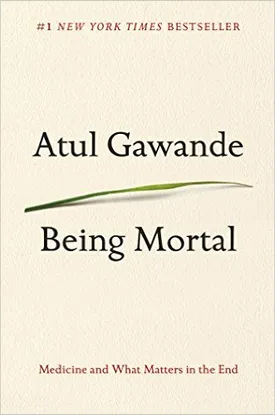Being Mortal: Medicine and What Matters in the End by Atul Gawande
Atul Gawande’s “Being Mortal: Medicine and What Matters in the End” is an insightful exploration into how modern medicine can help enhance the longevity of people’s lives, and how it can impact the quality of that remaining life. Through case studies and his personal experiences as a surgeon, Gawande looks at how people can live out their last years with dignity, with a sense of control, and making sure that they still have a meaningful life.
The book begins with Gawande introducing his concept of the ‘good death’. He explains the importance of considering how we can make the end of life better, and the responsibility of medical professionals to think beyond prolonging life and consider the marks of a meaningful life at the end stages. He looks at how different decisions can shape mortality, whether it’s through surgery or treatments, moving to a nursing home or hospice, taking risks or insisting on safety. Gawande also examines the importance of autonomy in making choices and being in control of what decisions are made.
Gawande chronicles his visits with his patients and shares the stories of their successes, hardships and tragic endings. Through the stories of his patients and from the perspectives of the caregivers, Gawande paints a vivid picture of the trials and tribulations of aging and end-of-life care. He looks at the importance of having a say in one’s medical decisions and the responsibility of medical professionals to consider the wishes of their patients and to help them find meaningful ways exist at the end of life.
Through case studies and research Gawande also explores the healthcare industry, examining the fluctuations between long-term quality of life and short-term medical feats. He sheds light on the medical practices that have the potential to improve the lives of the elderly, arguing that much of the industry is so focused on curing diseases that it overlooks important practical issues, like the individual’s quality of life. He looks at the importance of education and improvements in the healthcare system’s structure, in order to make sure senior citizens are able to age with dignity, autonomy and purpose.
The book provides readers an understanding of difficult situations as well as positive ways to strive for a good death for those who are facing a terminal diagnosis. For medical practitioners, Gawande offers practical advice on how to give their patients a better quality of life and how to take a compassionate approach in caring for those in need. He looks at the importance of balancing manageable risks and realistic expectations, and the potential to make the end of life more meaningful, instead of retreating from death with technological interventions.
Gawande's deep exploration into aging and death puts the focus on autonomy and individual concerns, and poses important questions on the power of doctors and nurses to grant people meaningful end-of-life care and a good death. He addresses difficult issues with a compassionate and humanistic approach, pushing us as a society to rethink how medicine deals with the end stages of life. In the book he provides an excellent insight into the aspirations of aging and an inspiring look at how medicine can do more to help us all face our mortality with grace.

